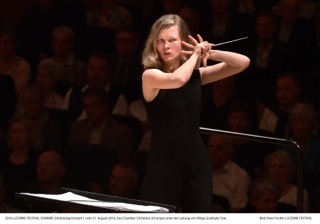 Switzerland Lucerne Festival (2) – Šerkšnytė, Beethoven: Chamber Orchestra of Europe, Mirga Gražinytė-Tyla (conductor), Kultur- und Kongresszentrum (KKL), Lucerne 21.8.2016. (JR)
Switzerland Lucerne Festival (2) – Šerkšnytė, Beethoven: Chamber Orchestra of Europe, Mirga Gražinytė-Tyla (conductor), Kultur- und Kongresszentrum (KKL), Lucerne 21.8.2016. (JR)

Šerkšnytė: “De Profundis” for string orchestra
Beethoven: Symphony No. 6
This summer the Lucerne Festival is highlighting female musicians; this Sunday was entitled a Grand Event Day on the Festival theme of “Prima Donna”. Those with sufficient musical stamina could start listening at 11am and continue almost uninterruptedly until the evening. All conductors and soloists were women; and a panel discussion, chaired by Festival Director Michael Haefliger, examined the ascendance of women conductors generally.
I only attended the day’s first concert, which gave me my first chance to see and hear Mirga Gražinytė-Tyla, who takes over imminently at the helm of the City of Birmingham Symphony Orchestra.
Birmingham has a particularly sure touch when it comes to choosing young up-and-coming conductors and places sound bets on young talent. (Zurich’s Tonhalle Orchestra, down the road from Lucerne, has just announced that Lionel Bringuier’s conduct as Principal Conductor will not be renewed after 2018, a decision which surprised few locally, especially not the music critics of the respected Neue Zürcher Zeitung. Zurich’s search for a replacement is now about to start; perhaps the Search Commission should ask the CBSO for the remains of its short list.)
The opening piece in this short Sunday morning concert was by Gražinytė-Tyla’s fellow Lithuanian composer, Raminta Šerkšnytė, of whom I must admit I had not heard. My loss. Her “De Profundis” for string orchestra stems from 1988, her University days; it’s a fine short work to which one opens one’s ears (rather than closing them as with much of modern music nowadays). The work begins quietly, with fluttering strings evoking a swarm of insects and quickly becomes more energetic. Šerkšnytė explains the work as evoking the life of a young adult where life often is made up of short sharp shocks, alternating euphoria and depression. There was no dissonance; the work is decidedly tonal. There were shades of Stravinsky, Pärt and Nielsen but Serksnyte has her own distinctive voice, which should be heard more widely. I suspect Gražinytė-Tyla will now be her champion outside Lithuania. There was much complex string writing, which had some violinists visibly counting the bars. The piece floats away gradually into the ether. The composer was present, and after embracing her younger compatriot, received plenty of warm acclaim from the audience.
The woodwind, brass and timpanist now joined the strings to have their chance to shine in the “Pastoral” Symphony. The clarinettist, flautist and valveless trumpeters were particularly impressive. As I have been reminded by the comment received below – musicians (who were acquainted through their involvement with the European Union Youth Orchestra) formed the Chamber Orchestra of Europe themselves in 1981; the players are now middle-aged. Claudio Abbado was one of the Chamber Orchestra of Europe’s main mentors but he did not create the COE (as I originally wrote). The orchestra has never had a principal conductor or a music director. They are a fine ensemble, if not quite in the elevated sphere of the Lucerne Festival Orchestra.
Gražinytė-Tyla, slender of frame and benevolent of countenance, graced the podium with floating arms and clear gestures and signals. It was good to hear such a well-known work delivered with crystal-clear textures and precise detailing. Perhaps the storm could have been more vicious (harder sticks for the timpani), but that’s a minor quibble in what was overall an excellent and joyful performance.
Birmingham has struck gold – yet again.
John Rhodes
Dear John,
Many thanks for a beautiful review of our concert with Mirga in Lucerne a few days ago.
We would just like to rectify one point in the description of the Chamber Orchestra of Europe in the last couple of paragraphs: the COE’s main characteristic, and the reason why they were real pioneers at the time, was that the musicians formed the orchestre themselves. Claudio Abbado happened to be one of the COE’s main mentors but he did not create the COE. The Orchestra has never had a principal conductor or a music director.
Thank you for your understanding and for amending your article if it is possible…
Best wishes,
Coralia Galtier
Business Development Manager
Chamber Orchestra of Europe
Thank you very much for contacting Seen and Heard. The information you gave us has been used to correct the review. Seen and Heard sends its good wishes to the COE.
Dear Jim,
Thank you very much for your correction and very best wishes from us all at the COE to Seen and Heard International.
Coralia